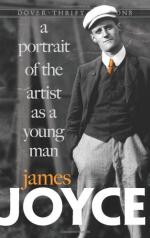—I told them all at
dinner about it and father
Dolan and I and all of
us we had A hearty laugh
together over it. Ha!
Ha! Ha!
* * * * *
The night of the Whitsuntide play had come and Stephen from the window of the dressing-room looked out on the small grass-plot across which lines of Chinese lanterns were stretched. He watched the visitors come down the steps from the house and pass into the theatre. Stewards in evening dress, old Belvedereans, loitered in groups about the entrance to the theatre and ushered in the visitors with ceremony. Under the sudden glow of a lantern he could recognize the smiling face of a priest.
The Blessed Sacrament had been removed from the tabernacle and the first benches had been driven back so as to leave the dais of the altar and the space before it free. Against the walls stood companies of barbells and Indian clubs; the dumbbells were piled in one corner: and in the midst of countless hillocks of gymnasium shoes and sweaters and singlets in untidy brown parcels there stood the stout leather-jacketed vaulting horse waiting its turn to be carried up on the stage and set in the middle of the winning team at the end of the gymnastic display.
Stephen, though in deference to his reputation for essay writing he had been elected secretary to the gymnasium, had had no part in the first section of the programme but in the play which formed the second section he had the chief part, that of a farcical pedagogue. He had been cast for it on account of his stature and grave manners for he was now at the end of his second year at Belvedere and in number two.
A score of the younger boys in white knickers and singlets came pattering down from the stage, through the vestry and to the chapel. The vestry and chapel were peopled with eager masters and boys. The plump bald sergeant major was testing with his foot the springboard of the vaulting horse. The lean young man in a long overcoat, who was to give a special display of intricate club swinging, stood near watching with interest, his silver-coated clubs peeping out of his deep side-pockets. The hollow rattle of the wooden dumbbells was heard as another team made ready to go up on the stage: and in another moment the excited prefect was hustling the boys through the vestry like a flock of geese, flapping the wings of his soutane nervously and crying to the laggards to make haste. A little troop of Neapolitan peasants were practising their steps at the end of the chapel, some circling their arms above their heads, some swaying their baskets of paper violets and curtsying. In a dark corner of the chapel at the gospel side of the altar a stout old lady knelt amid her copious black skirts. When she stood up a pink-dressed figure, wearing a curly golden wig and an old-fashioned straw sunbonnet, with black pencilled eyebrows and cheeks delicately rouged and powdered, was discovered. A low murmur of curiosity ran round the chapel at the discovery of this girlish figure. One of the prefects, smiling and nodding his head, approached the dark corner and, having bowed to the stout old lady, said pleasantly:




